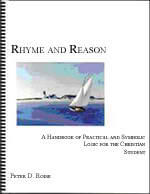
Logic 20I - Informal
Instructor: Mr. Eric Cummings
E-mail: somedaysomwhere@gmail.com
Phone: 708-954-7121
Course Description
Informal logic is logic in action in the real world -- the messy, and sometimes convoluted, syllogisms of everyday speech and writing. Rhyme & Reason (provided online) helps the student grapple with these challenges and avoid the danger of studying formal logic in isolation. Instead of producing great thinkers, logic without context may well produce those who think they know how to think, but don't. They're experts at rarified reason, while the meaning and subtleties of the argument they're analyzing is lost to them.
Our logic sequence features two improvements over deficiencies of traditional logic courses. First, it starts with the study of inductive reasoning (particular to general), which is at least as common as deductive reasoning. But it's often excluded from secondary school logic courses. Without studying induction, however, our view of logic will not be well-rounded.
Second you’ll learn to recognize the most common logical fallacies that appear daily in the media with assistance of our supplementary text: With Good Reason: An Introduction to Informal Fallacies by Engel (purchase required). Some lists contain over 200 such informal fallacies, but we'll focus on about 25-30 of the most common.
- Tuition: $275 Premier OR Tuition: $25 Basic
- Grade: 7-8 Grade: 7-8
- Mode: Synchronous Mode: Self-taught
- Offered: Fall Offered: Fall or Spring
- Textbook: See above Textbook: See above
Worldview Lab 301 – Islamics
Instructor: Pastor Paul Michael Raymond
E-mail: pastor@HisGlory.us
Phone: 434-352-2667
Course Description
This course examines Islamic history and culture from the standpoint of sharing the gospel (good news) of Christ with Muslims. Students learn to relate the love of Christ to Muslims with understanding of Muslim culture. Emphasis is placed on the presuppositional approach to apologetics in answering objections and addressing essential teachings of the Qr'an, using the text, "Muslims & Christians at the Table" (required purchase).
Students learn the basic elements of the Christian gospel to include use of the law to produce conviction of sin, the sacrificial death of Christ, repentance and faith in Christ. Over 30 practical methods of evangelism are presented for use in any culture. Term project involves mailing 100 postcards to Muslim names, with follow-up phone invitation into an online Bible Study with student as mentor.
- Tuition: $275 Premier OR Tuition: $25 Basic
- Grade: 9-12 Grade: 9-12
- Mode: Asynchronous Mode: Self-taught
- Offered: Spring Offered: Fall or Spring
- Textbook: See above Textbook: See above
- Teacher: Alina Fischer
Math 311
Instructor: Prof. Daniel Lebowitz
E-mail: dlebowitz.kwca@gmail.com
Phone: 541-292-8758
Course Description
The second improvement introduced by the King's Way Classical Academy logic sequence is also in the interest of turning logic into a tool that is practical for everyday use. Categorical and propositional logic (the usual topics of traditional logic at these grade levels) are primarily systems of representation and analysis; in other words, they turn language into symbols that can be analyzed according to certain set forms. While this kind of activity is an inescapable part of the study of logic, sometimes the jump from speech to symbol is made too quickly, and forces language into symbols that imperfectly reflect the actual meaning.
Logic 2 presents a system for dealing with logic in language that tries, as much as possible, to leave the language as it appears naturally and still provide the student with a helpful and consistent analysis of the argumentation. It is a kind of in-between system--not the same as merely considering reasoning in language without any system or symbols, but not as rigid or extensive a system as those of categorical or propositional logic.
Far from despising traditional logic, we must study the systems set forth by the pagans and recognize anything in them that is true and good, taking it as gold from the Egyptians. On the other hand, this course sets forth a positive biblical perspective on reasoning, as contrasted with autonomous and pagan perspectives that turn human reason into an idol. We must take this discipline captive to Christ. That means keeping what is good, and yet remaining ready to change or reject anything that is contrary to Him.
- Tuition: $275 Premier
- Grade: 8-10
- Mode: Asynchronous
- Offered: Spring
- Textbook: MyOpenMath.com
- Teacher: Daniel Lebowitz
- Teacher: Dave White
- Non-editing teacher: LMS Administrator